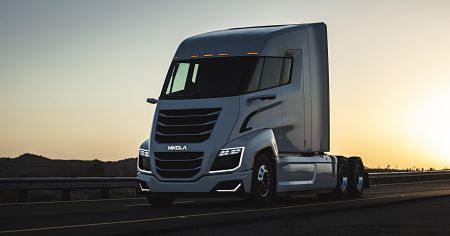Nikola rolls out hydrogen-powered semis in Arizona
Nikola, a newcomer in the trucking industry, rolled out its Nikola Two, a hydrogen-fueled semi, at its Nikola World event April 16 in Scottsdale, Arizona.
The American hybrid truck design company feels that hydrogen semi-trucks are the future of America’s clean trucking industry. While CEO and founder of Nikola Motor, Trevor Milton, knows there are challenges with hydrogen cars, he feels that big trucks are a much better choice for the clean, alternative fuel.
Nikola’s hydrogen fuel plans include building tens of thousands of hydrogen semi-trucks and a coast-to-coast hydrogen station network that will be needed to fuel them.
Moreover, the company wants to help other companies expand their hydrogen fuel cell vehicle sales as well, including Toyota, Honda, Hyundai, General Motors, and Daimler, by allowing them to use these stations so that they can take their vehicles outside of California.
“You can’t do this alone,” Milton told Forbes. “Toyota and the others can’t do it on their own and neither could we. The thing that Nikola brings to the table is we provide the entire network, we’re building 700 hydrogen stations around America. It will be the largest in the world.”
Nikola’s Jesse Schneider, executive vice president of hydrogen, discussed Nikola’s hydrogen fuel cell vision. The vision consists of the world’s first purpose-built fuel cell Class 8 truck, enabling more hydrogen storage, optimized placement of the powertrain, and a robust 70MPa hydrogen fueling network.
“We recently opened our first hydrogen station at our Phoenix headquarters. We are leading the way and working with industry and other OEMs to develop hydrogen standards to enable fueling in less than 15 minutes. The goal is safety and interoperability, so that anyone can fuel at our station. This is a big deal,” he said.
For the European market, Nikola President Mark Russell and Milton unveiled the never-before-seen Nikola Tre with its clean, contemporary design.
“With a range between 500 and 750 miles depending upon load, this gorgeous vehicle will have fast hydrogen fueling in under 15 minutes, even in Europe,” said Russell. “Think about Europe with no more diesel trucks,” said Milton. “The roads will be clean, quiet and beautiful.”
Nikola is not without its competition. Tesla has already signed up big-name companies like Pepsi, FedEx, Anheuser Busch, and Walmart for its electric semis. Other competitors include Daimlers, BYD and Thor.
Still, Milton sees a big advantage for Nikola’s hydrogen vehicles for long-distance highway runs of 500 miles or longer. What’s more, in addition to drive range, Nikola’s truck does have a huge advantage over Tesla’s battery-powered semi in that it is 5,000 pounds lighter.
Milton also pointed out that while Anheuser Busch ordered 40 or 50 trucks from Tesla, they ordered 800 from Nikola. “We’re sold out for eight years of production,” said Milton.
He called the Nikola Two “the most advanced commercial truck the world has ever seen.”
There are currently more than 13,000 Nikola trucks on order. The Nikola trucks feature up to 1,000 horsepower and 2,000 ft-lbs. of torque. Nikola recently announced a battery-electric vehicle option for the urban, short haul trucking market.
Nikola has partnered with Ryder System, Inc., and Thompson Machinery to offer world-class sales, service, and warranty through their over 800 locations across North America.
Full scale production of these vehicles won’t begin until late 2022 at the earliest.






